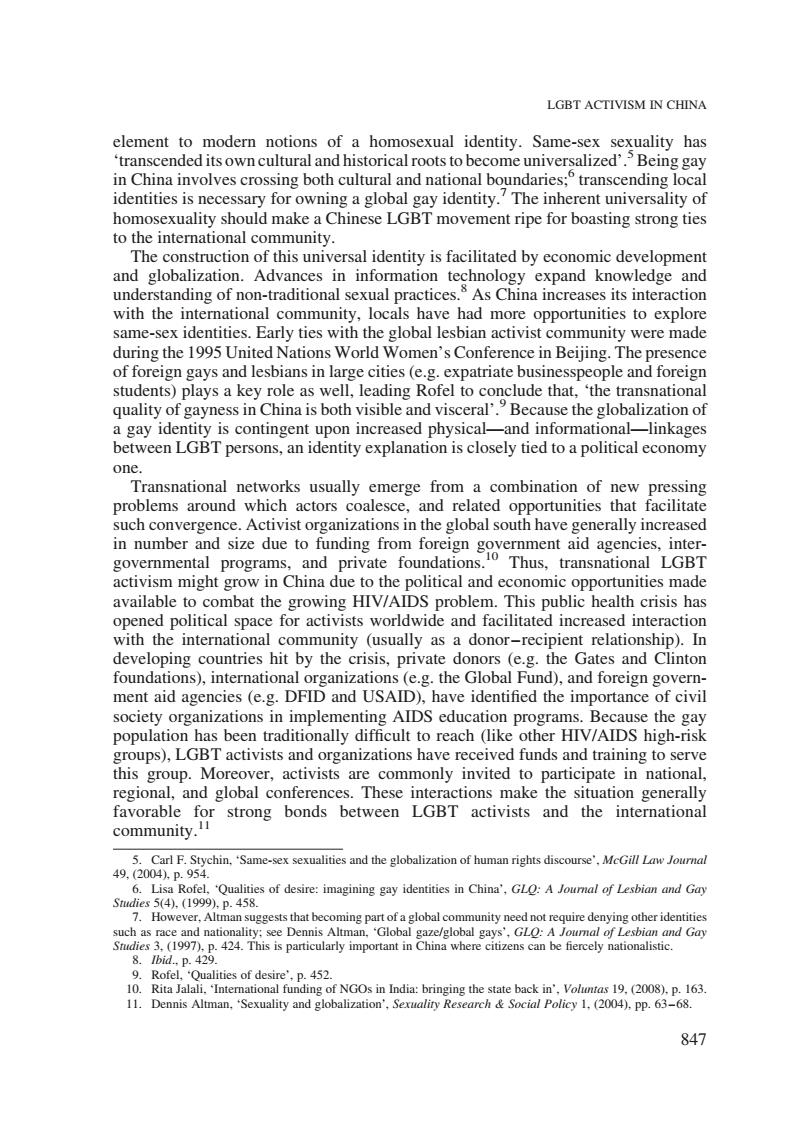正在加载图片...

LGBT ACTIVISM IN CHINA element to modern notions of a homosexual identity.Same-sex sexuality has transcended its own cultural and historical roots to become universalized'.Being gay in China involves crossing both cultural and national boundaries;transcending local identities is necessary for owning a global gay identity.'The inherent universality of homosexuality should make a Chinese LGBT movement ripe for boasting strong ties to the international community. The construction of this universal identity is facilitated by economic development and globalization.Advances in information technology expand knowledge and understanding of non-traditional sexual practices.As China increases its interaction with the international community,locals have had more opportunities to explore same-sex identities.Early ties with the global lesbian activist community were made during the 1995 United Nations World Women's Conference in Beijing.The presence of foreign gays and lesbians in large cities(e.g.expatriate businesspeople and foreign students)plays a key role as well,leading Rofel to conclude that,'the transnational quality of gayness in China is both visible and visceral'.Because the globalization of a gay identity is contingent upon increased physical-and informational-linkages between LGBT persons,an identity explanation is closely tied to a political economy one. Transnational networks usually emerge from a combination of new pressing problems around which actors coalesce,and related opportunities that facilitate such convergence.Activist organizations in the global south have generally increased in number and size due to funding from foreign government aid agencies,inter- governmental programs,and private foundations.0 Thus,transnational LGBT activism might grow in China due to the political and economic opportunities made available to combat the growing HIV/AIDS problem.This public health crisis has opened political space for activists worldwide and facilitated increased interaction with the international community (usually as a donor-recipient relationship).In developing countries hit by the crisis,private donors (e.g.the Gates and Clinton foundations),international organizations(e.g.the Global Fund),and foreign govern- ment aid agencies (e.g.DFID and USAID),have identified the importance of civil society organizations in implementing AlDS education programs.Because the gay population has been traditionally difficult to reach (like other HIV/AIDS high-risk groups),LGBT activists and organizations have received funds and training to serve this group.Moreover,activists are commonly invited to participate in national, regional,and global conferences.These interactions make the situation generally favorable for strong bonds between LGBT activists and the international community.11 5.Carl F.Stychin.'Same-sex sexualities and the globalization of human rights discourse'.McGill Law Journal 49.(2004).p.954. 6.Lisa Rofel,'Qualities of desire:imagining gay identities in China',GLO:A Journal of Lesbian and Gay Studies5(4).(1999),p.458. 7.However,Altman suggests that becoming part of a global community need not require denying other identities such as race and nationality:see Dennis Altman.'Global gaze/global gays',GLO:A Joumal of Lesbian and Gay Studies 3.(1997),p.424.This is particularly important in China where citizens can be fiercely nationalistic. 8.bid,p.429. 9.Rofel,'Qualities of desire',p.452. 10.Rita Jalali.'International funding of NGOs in India:bringing the state back in',Voluntas 19.(2008).p.163 11.Dennis Altman.'Sexuality and globalization',Sexuality Research Social Policy 1.(2004).pp.63-68. 847element to modern notions of a homosexual identity. Same-sex sexuality has ‘transcended its own cultural and historical roots to become universalized’.5Being gay in China involves crossing both cultural and national boundaries;6 transcending local identities is necessary for owning a global gay identity.7 The inherent universality of homosexuality should make a Chinese LGBT movement ripe for boasting strong ties to the international community. The construction of this universal identity is facilitated by economic development and globalization. Advances in information technology expand knowledge and understanding of non-traditional sexual practices.8 As China increases its interaction with the international community, locals have had more opportunities to explore same-sex identities. Early ties with the global lesbian activist community were made during the 1995 United Nations World Women’s Conference in Beijing. The presence of foreign gays and lesbians in large cities (e.g. expatriate businesspeople and foreign students) plays a key role as well, leading Rofel to conclude that, ‘the transnational quality of gayness in China is both visible and visceral’.9 Because the globalization of a gay identity is contingent upon increased physical—and informational—linkages between LGBT persons, an identity explanation is closely tied to a political economy one. Transnational networks usually emerge from a combination of new pressing problems around which actors coalesce, and related opportunities that facilitate such convergence. Activist organizations in the global south have generally increased in number and size due to funding from foreign government aid agencies, intergovernmental programs, and private foundations.10 Thus, transnational LGBT activism might grow in China due to the political and economic opportunities made available to combat the growing HIV/AIDS problem. This public health crisis has opened political space for activists worldwide and facilitated increased interaction with the international community (usually as a donor– recipient relationship). In developing countries hit by the crisis, private donors (e.g. the Gates and Clinton foundations), international organizations (e.g. the Global Fund), and foreign government aid agencies (e.g. DFID and USAID), have identified the importance of civil society organizations in implementing AIDS education programs. Because the gay population has been traditionally difficult to reach (like other HIV/AIDS high-risk groups), LGBT activists and organizations have received funds and training to serve this group. Moreover, activists are commonly invited to participate in national, regional, and global conferences. These interactions make the situation generally favorable for strong bonds between LGBT activists and the international community.11 5. Carl F. Stychin, ‘Same-sex sexualities and the globalization of human rights discourse’, McGill Law Journal 49, (2004), p. 954. 6. Lisa Rofel, ‘Qualities of desire: imagining gay identities in China’, GLQ: A Journal of Lesbian and Gay Studies 5(4), (1999), p. 458. 7. However, Altman suggests that becoming part of a global community need not require denying other identities such as race and nationality; see Dennis Altman, ‘Global gaze/global gays’, GLQ: A Journal of Lesbian and Gay Studies 3, (1997), p. 424. This is particularly important in China where citizens can be fiercely nationalistic. 8. Ibid., p. 429. 9. Rofel, ‘Qualities of desire’, p. 452. 10. Rita Jalali, ‘International funding of NGOs in India: bringing the state back in’, Voluntas 19, (2008), p. 163. 11. Dennis Altman, ‘Sexuality and globalization’, Sexuality Research & Social Policy 1, (2004), pp. 63–68. LGBT ACTIVISM IN CHINA 847